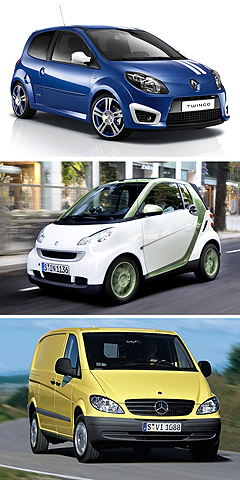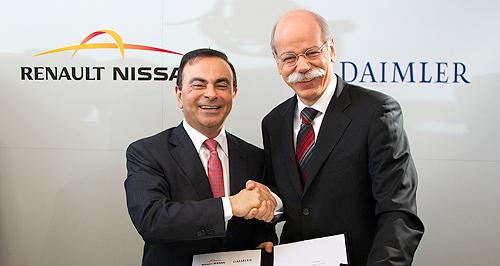News - DaimlerAuto giants jump into bedIt's a deal: Nissan-Renault's Carlos Ghosn and Daimler's Dieter Zetsche shake on the new alliance. Renault-Nissan and Daimler join forces in swap deal to cut product costs8 Apr 2010 RENAULT’S next-generation Twingo city car and Daimler’s Smart will share a new common platform under a far-reaching strategic alliance signed last night by Renault-Nissan and Daimler AG that will also extend to swapping engines and collaboration on commercial vehicle development. As part of the agreement, the automotive giants will each acquire a “symbolic” 3.1 per cent cross-ownership of each other under a share-swap arrangement announced jointly by Daimler chairman Dieter Zetsche and Renault-Nissan Alliance chairman and CEO Carlos Ghosn in Brussels. The co-operation – to be overseen by a 12-person board with equal representation from the three brands – is designed to slash development costs by up to €4 billion ($A5.75b) by 2015, as well as optimise production efficiency and cut C02 emissions, by sharing platforms, powertrains and parts sourcing. Mercedes-Benz four- and six-cylinder engines will be on offer to Renault-Nissan, while Benz will get three and four-cylinder petrol and diesel engines in return. Among the engine deals already revealed are Mercedes-Benz engines for Nissan’s luxury Infiniti range, and a Renault-Nissan diesel engine for the Mercedes Vito van. As well, the two groups will co-develop both diesel and petrol engines for the joint 2012 Twingo/Smart vehicle, which will be built jointly by Renault and Daimler – the two-door version at Renault’s Slovenian plant and the four-door at Smart’s Hambach factory in France.  From top: Renault Twingo, Daimler's Smart and Mercedes-Benz Vito. From top: Renault Twingo, Daimler's Smart and Mercedes-Benz Vito.Commercial vehicle co-operation will include a new entry-level van for Mercedes-Benz from 2012, based on a Renault design. The alliance is expected to spawn new technical joint ventures between Nissan, Renault and Daimler in future when each company deems it advantageous. Daimler’s Mr Zetsche was at pains to distance the new alliance from Daimler’s ill-fated joint venture with Chrysler, saying: “We start on earth this time and stay there.” Mr Zetsche ran Chrysler for five years from 2000. When he took over the top job at Daimler in 2006, he promptly set about flogging off the American company to venture capitalists Cerberus Capital Management in 2007. This time, the deal is said to be one of equals, each company milking each others’ strengths for improved vehicles and production efficiencies. “Our skills complement each other very well,” Mr Zetsche said. “Right away, we are strengthening our competitiveness in the small and compact car segment and are reducing our CO2 footprint – both on a long-tern basis.” Mr Ghosn said Renault and Nissan knew how to work successfully in a collaborative partnership. “This experience is extremely valuable in today’s and even more in tomorrow’s global auto industry.” The Infiniti G sports car – currently powered by a choice of Nissan four-cylinder and 3.7-litre V6 engines – is set to get a Mercedes engine in its next generation. The Renault-Nissan already has a range of strategic ventures with Dong Feng in China, Mahindra in India and AvtoVAZ in Russia, among others. Likewise, Daimler has done deals with a number of companies, including Chinese electric vehicle leader BYD and American electric sportscar pioneer Tesla. Daimler’s rival BMW has a similar technical arrangement with PSA Peugeot Citroen, sharing design and production of powertrains – including the four-cylinder engine under the bonnet of Mini, Peugeot and Citroen small cars. Volkswagen also recently signed an arrangement with Japan’s Suzuki. Renault owns 44 per cent of Nissan, which in turn owns 15 per cent of Renault. Between them, they employ 350,000 people with revenues of €86.5 billion ($A124b) last year. By comparison, Daimler AG employs a workforce of 256,000 and generated €78.9 billion ($A113.5b) in 2009 revenue.  |
Click to shareDaimler articlesMotor industry news |














Facebook Twitter Instagram